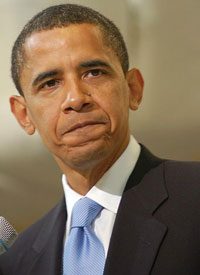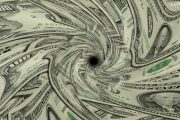
PRESIDENT OBAMA: Here — here’s what I’ve heard — from a range of economists acro — across the political spectrum. The banks, because of mismanagement, because of huge risk taking, are now in very vulnerable positions. We can expect that we’re gonna have to do more to shore up the financial system. We also are gonna have to make sure that we set up financial regulations so that not only does this never happen again, but you start having some sort of — trust in how the credit markets work again.
MATT LAUER: Right.
PRESIDENT OBAMA: I do have confidence that we’re gonna be able to get it right. But it’s not gonna be overnight. And there’s no silver bullets to this. The fact of the matter is, is that we are suffering from a massive hangover from a binge of risk taking.
Such a lack of understanding about how the recession was created is disturbing to any informed American.
Obama noted that banks engaged in risky practices as the housing bubble swelled. That much is true. But the interview leaves the strong but misleading impression that the recession is the result of "free enterprise" or "unrestrained capitalism." Nowhere in the interview is there any hint of the reality that those same bankers had been spurred into action by historically low interest rates subsidized by the Federal Reserve Bank over the past 15 years.
The Federal Reserve Bank created the housing bubble with its attempts to set under-market interest rates over the past 15 years, thereby making money easy to borrow on under-market rates. All the bankers did was to pass on the same easy credit they had obtained from the Federal Reserve to borrowers, who bid up the price of property far beyond what the market would sustain.
The crisis was also aided by long-term deficit spending that — with Obama’s “stimulus” package — will now swell to more than $1.39 trillion in fiscal 2009, according to the Congressional Budget Office.
Unfortunately, Obama’s “stimulus” plan for the economy is to let the Federal Reserve Bank cut the discount interest rates to the lowest rate in modern history (the Primary Discount Rate now stands at 0.5%) and to increase the deficit with an $800 billion “stimulus” plan (that has already ballooned to $900 billion in the Senate version).
In other words, Obama’s plan is to do more of what got this nation into trouble in the first place.
A popular definition of “insanity” is “to do the same thing over and over and expect a different result.” Using that definition, Obama’s economic plan is insanity.
Congressman Ron Paul (R-Texas) proposed a realistic alternative: drastic spending cuts along with tax breaks to match.
Americans now have a clear choice: an insane plan to worsen the recession into a depression or Congressman Paul’s sensible plan for economic recovery.



